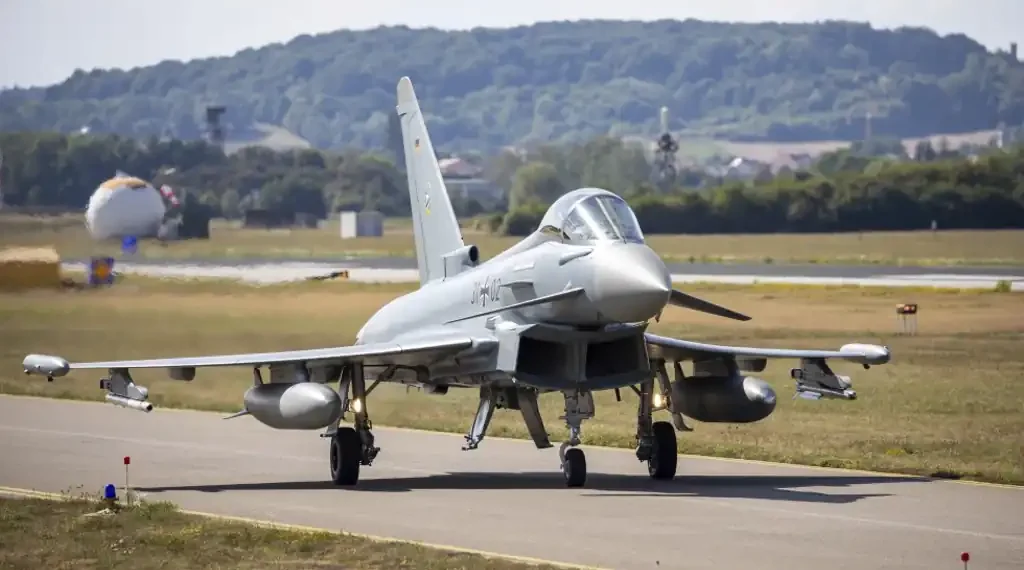German and Swedish Jets Intercept Russian Reconnaissance Aircraft Flying Without Flight Plan Over Baltic Sea Amid Rising NATO Tensions
Published Time: 09-22-2025, 11:00 EDT
German and Swedish fighter jets intercepted and tracked a Russian reconnaissance aircraft flying over the Baltic Sea without identification or communication, defense officials confirmed Sunday. The incident highlights continuing tensions in the region as NATO members maintain heightened vigilance against Russian military activities near European airspace.
Russian Reconnaissance Aircraft Detected
According to statements from the Swedish Air Force and the German Luftwaffe, the interception occurred on Sunday when a Russian IL-20 surveillance aircraft was spotted in international airspace above the Baltic Sea. The plane had not submitted a flight plan and was not maintaining radio contact, raising security concerns among regional defense forces.
Two Swedish JAS 39 Gripen jets and two German Eurofighter Typhoons were scrambled to identify and monitor the Russian aircraft. Officials said the monitoring operation was conducted professionally and ended without incident.
NATO Response and Regional Context
The interception follows a series of airspace violations and reconnaissance flights that have kept NATO on alert in recent months. European defense officials say such activities underscore the risks of miscalculation as the war in Ukraine continues to influence regional security.
Just two days earlier, on Friday, three Russian fighter jets entered Estonia’s airspace without authorization, remaining there for approximately 12 minutes, according to the Estonian Foreign Ministry. That incident prompted a formal diplomatic response and raised fresh concerns about Russian military maneuvers in the Baltics.
Last week, NATO aircraft also shot down Russian drones over Poland, further intensifying fears that the ongoing conflict could spill over into allied territory.
Coordination Between Germany and Sweden
In Sunday’s operation, the German Luftwaffe reported that its Eurofighter jets first intercepted the Russian reconnaissance plane before transferring responsibility to Swedish Gripen fighters. After the handoff, the German aircraft returned to their base at Rostock-Laage Airfield in northern Germany.
The Swedish Air Force confirmed the sequence in a public statement on its official X (formerly Twitter) account: “Today, JAS 39 Gripens and German Eurofighters were scrambled over the South Baltic Sea, identifying and monitoring a Russian IL-20 reconnaissance aircraft in international airspace.”
The incident was managed under NATO’s Baltic Air Policing mission, which coordinates allied responses to potential threats in the region.
Heightened Security Concerns in the Baltic
The Baltic Sea has become a focal point of security concerns for NATO, particularly as Sweden recently completed its accession to the alliance in 2024, further strengthening the bloc’s northern defenses. Military analysts note that Russian reconnaissance flights in the area are not uncommon but have increased in frequency since the full-scale invasion of Ukraine in 2022.
Officials emphasize that while such interceptions generally conclude without escalation, they pose risks due to the absence of communication and established flight plans. Airspace monitoring ensures that civilian and military aviation in the region remains safe and secure.
Regional Reactions
While neither Germany nor Sweden reported aggressive maneuvers from the Russian aircraft, officials reiterated the need for constant vigilance. NATO members bordering the Baltic Sea—including Estonia, Latvia, Lithuania, Poland, and now Sweden—have consistently raised concerns about Russian military activity just outside their national airspace.
Estonian authorities, reacting to the Friday violation, said repeated incidents undermine European security and threaten to destabilize the region. EU leaders have echoed those concerns, urging Russia to respect international aviation norms.
Ongoing Monitoring and NATO Preparedness
Military experts note that NATO’s swift and coordinated response demonstrates its capacity to deter potential threats. Air policing missions in the Baltic region have been in place since 2004, ensuring collective security for allies without extensive air defense resources of their own.
The German Luftwaffe and Swedish Air Force emphasized that Sunday’s operation was a routine defensive measure. However, officials also acknowledged that such encounters serve as reminders of the fragile security environment in northern Europe.
As tensions persist, NATO member states are expected to maintain a high level of readiness to intercept and monitor any unauthorized or unidentified aircraft operating near allied airspace.
Conclusion
The interception of the Russian IL-20 reconnaissance plane over the Baltic Sea adds to a series of recent airspace incidents involving NATO members and Russian forces. While the operation concluded without escalation, European officials stress the importance of vigilance and cooperation among allies as the conflict in Ukraine continues to reverberate across the region.
This article was rewritten by JournosNews.com based on verified reporting from trusted sources. The content has been independently reviewed, fact-checked, and edited for accuracy, neutrality, tone, and global readability in accordance with Google News and AdSense standards.
All opinions, quotes, or statements from contributors, experts, or sourced organizations do not necessarily reflect the views of JournosNews.com. JournosNews.com maintains full editorial independence from any external funders, sponsors, or organizations.
Stay informed with JournosNews.com — your trusted source for verified global reporting and in-depth analysis. Follow us on Google News, BlueSky, and X for real-time updates.














